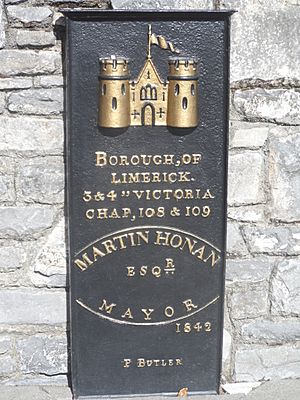Municipal Corporations (Ireland) Act 1840 facts for kids
| Act of Parliament | |

|
|
| Long title | An Act for the Regulation of Municipal Corporations in Ireland. |
|---|---|
| Citation | 3 & 4 Vict. c. 108 |
| Territorial extent | Ireland |
| Dates | |
| Royal assent | 10 August 1840 |
| Commencement | 25 October 1840 |
| Repealed | 1972 and 2001 |
| Other legislation | |
| Repealed by |
|
|
Status: Repealed
|
|
The Municipal Corporations Act (Ireland) 1840 was a very important law passed by the Parliament of the United Kingdom on August 10, 1840. Its main purpose was to change how local governments, often called "municipal corporations" or town councils, worked in Ireland.
Before this law, Ireland had 68 town councils. Many of them were not working well. Some had almost stopped functioning, and none truly represented the people living in their towns. This Act closed down all but 10 of these old councils.
Contents
Why the Law Was Needed
This new law was similar to one passed earlier for England and Wales, called the Municipal Corporations Act 1835. That law had also reformed town councils.
After the Acts of Union 1800, Ireland had fewer towns that could send Members of Parliament (MPs) to the main UK Parliament. By 1801, only 33 towns in Ireland could send MPs.
Experts looked into how these town councils were working in Ireland. They found that out of 117 towns that once had councils, only 99 had actually done anything in the past 100 years.
They also found many towns that used to have councils but no longer did. Some had old royal documents (charters) that said they were councils, but they weren't acting like one. Others had no record of ever being a council. About 30 councils had completely disappeared since the Union of Great Britain and Ireland in 1801.
New and Improved Town Councils

The Act decided that only ten towns would keep their councils. These new councils were called Mayor, Aldermen and Burgesses. The only exception was Dublin, where the head of the council was still called the Right Honourable Lord Mayor.
Here are the ten towns that kept their reformed councils:
| Borough | County |
|---|---|
| Belfast | Antrim and Down |
| Clonmel | Tipperary |
| Cork (County of the City) | Cork |
| Drogheda (County of the Town) | Louth and Meath |
| Dublin (County of the City) | Dublin |
| Kilkenny (County of the City; merging the former boroughs of Kilkenny and Irishtown) |
Kilkenny |
| Limerick (County of the City) | Limerick |
| Londonderry (City) | Londonderry |
| Sligo | Sligo |
| Waterford (County of the City) | Waterford |
Old Councils Closed Down
On October 25, 1840, the Act officially closed down the remaining 58 town councils. These councils were listed in different parts of the Act.
Some of these closed councils could ask for their council status back, especially if they were a town with more than 3,000 people. For example, Wexford successfully got its council back in 1846. Cashel also tried, but it didn't work out.
Other councils were already almost gone when the Act was passed. These towns were not allowed to apply for their council status back.
New Local Leaders: Town Commissioners
Many of the towns that lost their old councils already had another type of local government. These were groups of "commissioners" who managed things like street lighting under a law from 1828.
If a town had these commissioners, they took over from the old council. If a town lost its council and had valuable property but no commissioners, the 1840 Act created a new board of "municipal commissioners" for them.
Over time, most of these new commissioners started using the rules from the 1828 law or a newer one from 1854. By 1876, only Carrickfergus was still run by commissioners set up directly by the 1840 Act.
 | Bessie Coleman |
 | Spann Watson |
 | Jill E. Brown |
 | Sherman W. White |

